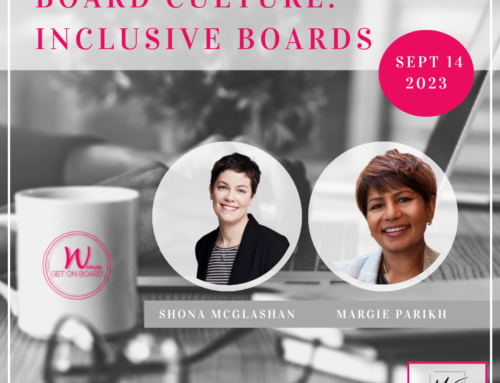Women Get On Board Inc. (WGOB) is a member-based company that connects, promotes and empowers women to corporate boards. On October 5th, WGOB held a virtual webinar on Elevating Your Board Effectiveness. The event was sponsored by BMO, WGOB’s national strategic partner. The session provided practical insights, intelligence and tools to empower women with the skills and confidence to lead and serve on boards.
Sheri Griffiths, Senior Vice President & Head of Ontario Canadian Commercial Banking at BMO &
Executive Sponsor, BMO for Women, kicked off the event.
“At BMO, we have a rich history of supporting women. We are furthering this with initiatives like the BMO Celebrating Women Grant Program and the BMO Women in Leadership Fund. In addition, we are proud to partner with Women Get On Board,” Sheri said.
Sheri introduced Deborah Rosati, FCPA, FCA, ICD.D, Corporate Director, Founder, and CEO of WGOB. Deborah began the event with a presentation on Elevating Your Board Effectiveness, based on her recent e-book of the same name. She covered two major concepts:
- Finding Your Voice in the Boardroom
- Emotional Intelligence in the Boardroom
- Finding Your Voice in the Boardroom
It can be challenging to find your voice when you are a new board member. To speed up the process, Deborah recommended embracing the four Ps:
Purpose
Your purpose is your reason for serving on the board.
“Purpose is bigger than oneself. Women Get On Board is my social purpose company. My purpose is to connect, promote and empower women to corporate board—one woman and one board at a time,” said Deborah.
Passion
Your passion is the reason why you care about the board you’re serving. When you bring true passion to the board you are serving, it elevates your voice—and it’s contagious! Suddenly the whole board has higher enthusiasm.
Presence
Your presence is how you demonstrate your purpose and passion to the other board members sitting at the table.
“Remember that you are on the board because of your expertise, your skills, your strategic insight and your leadership,” said Deborah. “If something doesn’t feel right after you’ve heard out your colleagues, make sure you stand behind your instincts.”
Power
Your power is how you affect meaningful change at the board level. In Deborah’s experience, there are three main stages for women stepping into their power. First, you must find the courage to lean in. Next, you use the power of learning to improve continuously. Finally, you use your power to sponsor and elevate other women.
“If you only take one thing from this conversation, I hope that you work to find a sponsor or to sponsor someone else. We can all help each other get a seat at the board table,” Deborah said.
- Emotional Intelligence in the Boardroom
In Deborah’s decades of board service, she observed that emotional intelligence is one of the most critical and least discussed boardroom skills. Embrace the 4 Cs:
Competency
You should have technical and social competency. Technical competency is your unique board value proposition. Social competency is your ability to listen, observe others and be self-aware.
Character
Once you have developed your foundation, use your social competency, self-awareness and self-regulation to demonstrate your character. For example, be the last to speak.
Courage
Motivation and empathy are two essential parts of courage. Motivation in the boardroom is your commitment to lean in. Empathy is your ability to put yourself in someone else’s shoes — something that takes true bravery.
Deborah gave an example of when she wished she had courage. She was chairing an audit committee when one of the board members fell asleep. At the time, she felt annoyed.
“I wish I had the courage to follow up after the meeting and say, ‘Hey, is everything okay?’ But, unfortunately, it turned out he had a serious health issue. I think if we became more empathetic, we would have better understandings of each other,” Deborah said.
Chemistry
Chemistry is a composite of competence, character and courage. At the boardroom table, this means establishing positive relationships with other board members, gaining their trust and knowing how to balance when to be assertive with when to be a team player.
After covering the 4Ps and the 4Cs, Deborah wrapped up her presentation.
“In my 35 years of entrepreneurial financial and governance experience, I’ve learned that it’s not enough to take a seat at the table. You have to show up, serve and consistently elevate your board effectiveness,” she concluded.
Panel Discussion
Following Deborah’s presentation, a panel discussed the key learnings. Panellists included:
- Moderator: Lisa Milburn, Chief Marketing and Communications Officer, BMO Wealth Management & Executive Sponsor, BMO for Women
- Panellist: Norma Beauchamp, Corporate Director and Independent Management Consultant, Corporate and Not For Profit Director
- Panellist: Faten Alshazly, Founder & Chief Creative Officer, WeUsThem Inc., Corporate Director
“The best way to bring the Ps and the Cs to life is to hear about your personal experiences,” said Lisa. “Faten and Norma, how have you been able to find your voice in the boardroom?”
Faten recalled that when she recently joined a board, she found that she had a burning question about the company’s financials. But, because her background is in marketing, she was initially nervous about raising the question.
“We have a duty as a board member to make the best decisions possible. I thought it was the right thing to ask, so I did,” she said.
At first, the board met her with silence. Then, the chair smiled and said she had hit on an important topic. From that moment, Faten knew she needed to use her voice in the board room.
Lisa observed that being on a board is a huge commitment. She asked the panellists if passion drove their board commitments. Norma said she is active in the healthcare sector because she is passionate about making Canada healthier.
“At the end of the day, the question I ask myself is: am I solving a problem that helps our society?” she said.
Next, Lisa asked the panellists how they use their influence and power and the board table.
“Deborah said it right: listen and learn,” said Norma. “A board chair inspired me to apply the THINK Principle. Before you speak, ask yourself: is it True? Is it Helpful? Is it Inspiring? Is it Necessary? Is it kind?
Faten added that it’s essential to give a voice to those at the table who are quieter.
Lisa asked the panellists if there were other ways they use emotional intelligence at the board level.
Faten said that her emotional superpower is being a good listener. “I listen to everyone’s opinions, and then I act,” she said. She complements her emotional intelligence with her key technical competency: a true recognition of diversity, inclusion and equity.
Norma said her emotional superpower is that she genuinely wants the people around her to succeed. Her technical competency is her ability to use good judgement.
Sheri closed out the lively panel discussion on how to elevate your board effectiveness. She invited attendees to network in breakout rooms facilitated by Deborah, Norma, Faten, as well as Anar Popatia, ICD.D, Corporate Director and Poonam Puri, Professor of Law, Osgoode Hall Law School.
Are you interested in learning more about board governance? Join us for our next virtual event on November 17th called “Shareholder Activism: What Independent Directors Need to Know,” sponsored by Gowling WLG. Register here.




